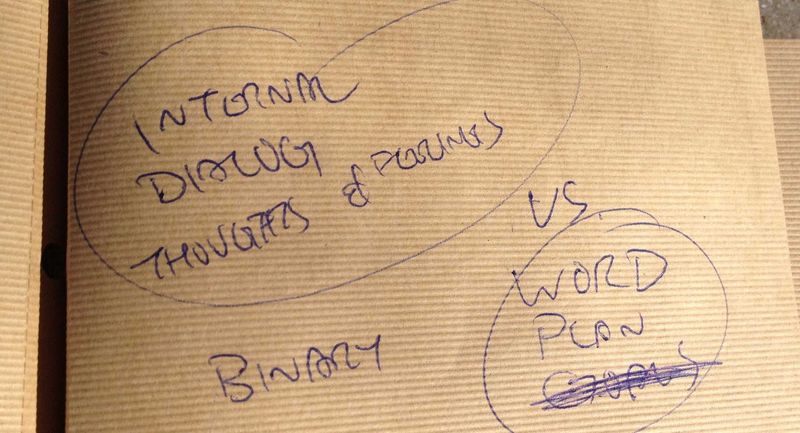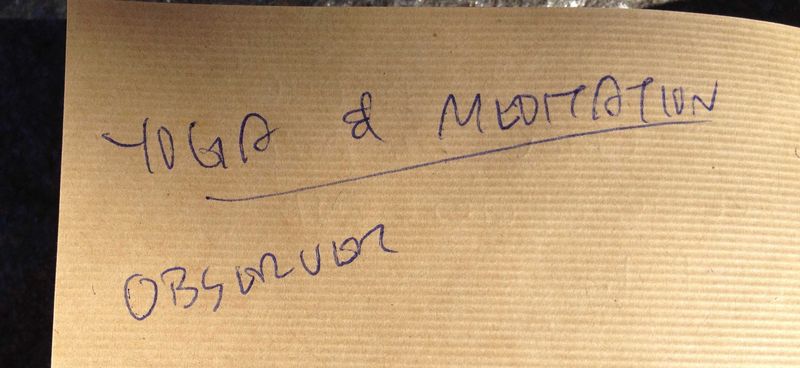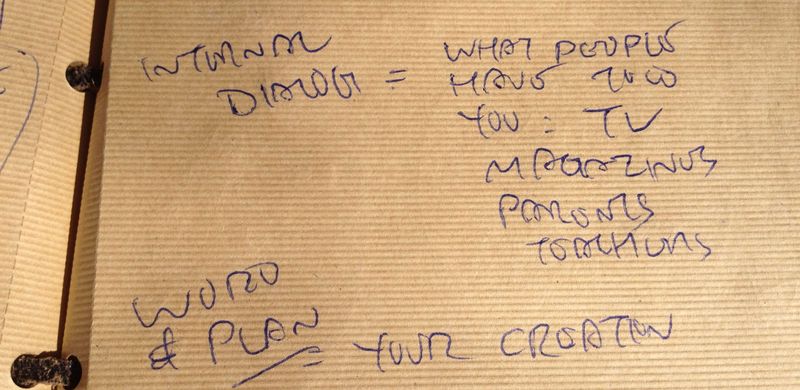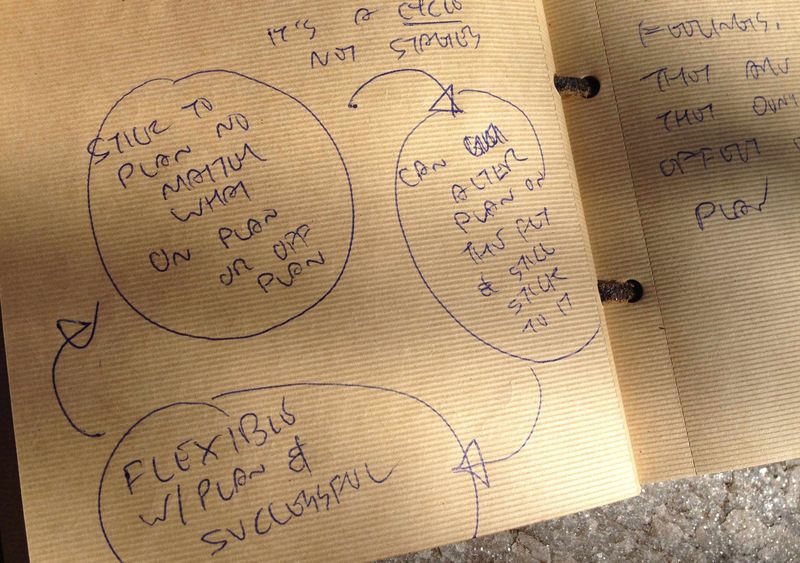Shockingly, you actually don't need to get your internal dialog to be nice and wonderful all of the time to get the results you want. Or even to feel good about your body.
You've got other options.
Here's how I would summarize what I've learned about personal growth and philosophy, as it applies to fat loss:
1.) You're going to have thoughts and feelings.
2.) Your thoughts and feelings are massively influenced by the past: What people have told you, what you've seen on TV, decisions you've made about how the world works and what's possible for you, based on things that happened to you.
3.) Because your thoughts and feelings were mostly given to you by external forces, you actually don't have a lot of say in your thoughts and feelings.
4.) Your thoughts and feelings (from your past) aren't always going to be supportive of your plans, your goals, your future or your body image.
5.) You should stop expecting your thoughts and feelings to support new goals. They may, or they may not. It's like the weather.
6.) You aren't: You aren't internal dialog. You aren't your thoughts and feelings. Those just sort of happen.
7.) You are: Your plans. Your actions. Your goals. Your promises.
In meditation, they sometimes talk about the "observer" being distinct from the thoughts and feelings he or she is observing. I took one class where we imagined our mind as a blue sky, and thoughts were like clouds that we would just notice going by.
In some Landmark Education courses they say it even more elegantly: "You aren't your internal dialog. You are your promises."
If you think of your thoughts about body image mostly being given to you by television and Pinterest and magazines and what someone told you when you were a kid or what your boyfriend or girlfriend said in high school… it becomes obvious really quickly that your internal dialog isn't necessarily set up to support you.
That's ok. That's just being human. And it's ok to be human.
Same thing with food. Your thoughts about food have mostly been given to you by commercials and TV and what your parents told you growing up or what decisions you made about what to do about food in junior high and high school… Again, it becomes obvious that your internal dialog about food isn't necissarily set up to support you.
That's ok. That's just being human. And it's ok to be human.
So stop trying to manage your thoughts and feelings. And stop thinking that your results would be different if you had different thoughts and feelings. Just notice your thoughts and feelings.
Thoughts and Feelings vs. Plans, Promises, and Actions
Totally Unrelated
You can ACT on your thoughts and feelings, or you can ACT on your plans and promises. Notice that your plans may run counter to your thoughts and feelings. That's normal. That's human. That's how you achieve a new goal.
Really, it's about that simple:
You can take ACTION based on your thoughts and feelings
<or>
You can take ACTION based on your promises and plans
Really, I don't care if every thought you have is unsupportive. As a trainer, I just want to go to work on your actions.
Again, just notice:
Your thoughts and feelings mostly come from the past
<or>
Your plans and promises (actions) are created by you, for the future
I'm using the word promise here in kind of an usual way. But, lets say, I've eaten seventeen free meals per week for the last ten years. If I get a new food plan, and then I promise to eat only fifteen free meals next week, then that promise is creating a new me. For the rest of the week I can be my past, or I can be my new promise.
You've got a plan: It's actions you are promising to take. You get to choose the actions you take now. You get to choose which actions you promise to take in the future.
Levels of Plans, Promises, and Actions
So you have a plan, hopefully you promise to follow it.
The first level of maturity in following a plan: Stick to the plan no matter what.
This is where people struggle with being "on plan" or "off plan", and having nothing in between. People "fall off the wagon" or "have one bad meal and give up".
The second level of maturity in following a plan: Plan is slightly flexible, but you're accountable for changes.
You can alter the plan: If you have three free meals per week, you're able to move a free meal and "re-promise" and stick to the plan. Or you're able to even able to have an extra free meal and "re-promise", and stick to the plan. Or, you are able to fall off plan, and then make a new promise and get back on plan.
The highest level of maturity in following a plan: You follow the plan most of the time, but are able to be totally flexible and get back on plan, and get results.
At this level, you follow the plan most of the time. If something comes up or something has to change, it has no impact on the fact that you follow the plan most of the time. If you take a week vacation (off plan), not only do you have no trouble getting back on plan when you get back, but you also don't feel a need to "catch up" or do anything weird or drastic, you just get back on plan. Similarly, if you do fall off plan, you are able to just get back on plan, without doing anything drastic or trying to catch up, you just get back on plan.
The trick though, is not to think of these levels like belts you'd get in a martial art. Instead, think of them as a cycle. The normal, and human thing to do, is to rotate through those levels at different stages of your life, and at different stages of your goals.
You don't actually win any prizes for moving up to the next level. Don't think of it as having achieved something, because it isn't static. Think of it as a season.
Now, with practice, you can spend more time at the more mature levels of following a plan. But you aren't a robot.
Don't Try to Be A Robot
A lot of people think that if they were just robot perfect in thoughts and actions, they could get all of the results they want.
The truth is exactly the opposite: Embrace your humanity.
Embrace your imperfections. Embrace your unsupportive thoughts and feelings from the past, they probably aren't going anywhere. Embrace that fat loss is hard. Embrace that you don't want to do stuff that's hard.
Stop fighting all of that stuff, and just notice it. Yep, you're still human.
Notice that if you're human: Your body image is either negative (yep, you're human)… Or, if it's positive, then a lot of times your body is like a tool to get you something, and how you're driven to keep that tool getting you what you want (yep, you're human).
Now, maybe you had perfect parents, and great teachers, and great coaches, and never had your heart broken, and never watched TV, and never made any decisions about what your body means in relationship to other people… and if so, then you probably have a really great and supportive internal dialog 100% of the time.
For the rest of us: It's ok to be human. You should expect to keep being human.
by Josh Hillis
author of the upcoming Fat Loss Happens on Monday for OnTarget Publications. Coming January 2014.
also The 21 Day Kettlebell Swing Challenge
and The Josh Hillis Fat Loss Coaching Session
this post was brought to you by, thinking about my online nutrition coaching, and a long hike. Plus, if there's one thing that I've learned from internet memes: Everything sounds like ten times more wise when connected to a picture of nature. Or a picture of Gandalf.








I just so dig your posts – but I think this is the best ever!!! Thanks.
Thanks Nancy!!!!!!